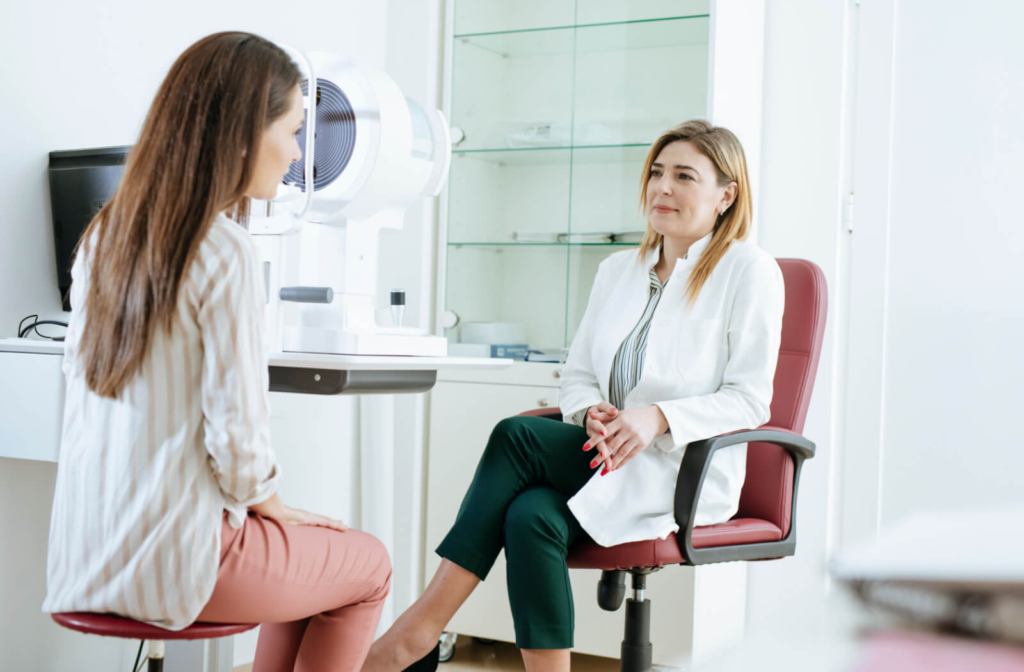Everyone needs eye exams, from childhood through to your adult years. These examinations are essential for protecting your vision.
When you book your next eye exam, how long can you expect to be at the optometrist?
Eye exams can vary in length depending on your needs, from 30 minutes to over an hour.
For example, some patients need a more detailed eye exam due to a high risk of eye disease, or they may need a dilated eye exam.
You can ask your eye doctor how long your exam will last—they’re always available to help.
Eye Exams Help Protect Your Eye Health & Vision
Comprehensive eye exams feature many diagnostic tests to assess your vision and identify potential eye problems. No matter the length of your eye exam, they are worth the time for peace of mind regarding your eye health.
Eye exams can seem unnecessary, especially if you see clearly, but your eyes are much more than just clear vision. Many eye diseases can develop with limited symptoms, making eye exams crucial for identifying potential problems.
Eye exams can help diagnose many eye conditions, including:
How Often Should You Have an Eye Exam?
While your eye exam doesn’t take long, you may wonder how often you need one. The answer isn’t the same for everyone—eye exam frequency depends on a patient’s health and age.
Some patients find their vision changes sooner than 2 years. If you feel any blurriness or discomfort in your vision, it is best to call the office and book an eye exam as soon as possible.
According to the Canadian Association of Optometrists, adults 20 to 39 without any eye-related risks or problems should have an eye exam at least every 2–3 years. Adults aged 40 to 64 should have an eye exam at least every 2 years, while older adults over 65 should have an annual eye exam.
For infants and toddlers, it is recommended they receive their first eye exam between the ages of six to nine months, while preschool children should come in for their eye exam once again between the ages of two and five years old. School-aged children should come at least once a year to get their eyes checked up until the age of 19.
Patients with conditions like diabetes or post-operative LASIK/eye surgery patients may need an annual eye exam to catch any potential problems as early as possible. Your optometrist will recommend an eye exam schedule based on your eye care needs.

What Happens During Your Eye Exam?
Eye exams are more than a vision test—your eye doctor looks at many aspects of your eye health and vision to protect your sight and identify problems as early as possible.
Your eye exam includes numerous diagnostic tests, from colour blindness to retinal scanning. Some of the critical parts of your exam include visual acuity and eye health evaluation.
Medical History
Whether you’re a new or returning patient, ensuring your medical history is up to date is an important part of your eye exam.
Your eye doctor will ask several questions about your lifestyle, work, medical history, and family history to identify potential eye-related risks or concerns.
Visual Acuity
Visual acuity is what most patients think of when they envision an eye exam—”how clearly can you see.” Your optometrist tests this by having you read an eye chart to help identify if you require corrective lenses. If you have a refractive error, a refraction test helps find the right lens power for your glasses.
Eye Health Evaluation
An eye health evaluation is essential to identify eye disease as early as possible. Many conditions have limited symptoms in their early stages, making them hard to diagnose. An eye health evaluation helps your eye doctor to look closely at the eye’s internal structures, like the retina, optic nerve, and more.
Your optometrist uses different technology to examine your eyes and make an accurate diagnosis. If necessary, they’ll use eye drops to dilate your eyes and see the internal structures more easily. They may also refer you to a specialist for further evaluation if needed.
What Happens After Your Eye Exam?
Your eye doctor will review and discuss your results after completing your tests. If you have an eye problem, your optometrist will recommend a customized treatment plan to address the issue and manage your eye health.
If your prescription or results of your eye exam require eyeglasses, you’ll work with one of our opticians to find lenses and frames best suited for your vision needs.
Time for an Eye Exam? Book Yours Today
Eye exams are important for your health and vital in maintaining your vision as it is essential to your everyday life. By being on top of your ocular health, your optometrist is able to assess your eyes and identify any potential problems or risks early on. Don’t leave your vision up to chance—visit your eye doctor regularly.
Contact us at West Coast Optical when it’s time for your next eye exam.



